 MyDogBreeds
MyDogBreeds Majestic Tree Hound is originated from United States but Bichon Frise is originated from Spain. Majestic Tree Hound may grow 46 cm / 19 inches higher than Bichon Frise. Majestic Tree Hound may weigh 40 kg / 89 pounds more than Bichon Frise. Majestic Tree Hound may live 6 years less than Bichon Frise. Both Majestic Tree Hound and Bichon Frise has same litter size. Both Majestic Tree Hound and Bichon Frise requires Low maintenance.
Majestic Tree Hound is originated from United States but Bichon Frise is originated from Spain. Majestic Tree Hound may grow 46 cm / 19 inches higher than Bichon Frise. Majestic Tree Hound may weigh 40 kg / 89 pounds more than Bichon Frise. Majestic Tree Hound may live 6 years less than Bichon Frise. Both Majestic Tree Hound and Bichon Frise has same litter size. Both Majestic Tree Hound and Bichon Frise requires Low maintenance.
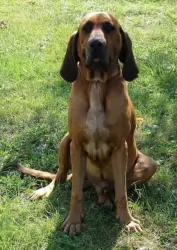 The Majestic Tree Hound is a fairly new crossbreed dog. While the actual breed is very recent, the stem stock goes way back to medieval times.
The Majestic Tree Hound is a fairly new crossbreed dog. While the actual breed is very recent, the stem stock goes way back to medieval times.
The dog’s heritage goes back to the St. Hubert Hound named after Francois Hubert. He bred the best scenting hounds in Southern France.
In fact when France experienced political unrest that resulted in emigration to the United States, they brought their dogs, among them hound dogs which were then crossed with other dogs. Bloodhounds, English Foxhounds, American Coon and Big Game Hounds have all contributed to the Majestic Tree Hound after a long time of breeding to bring forth a hound that had sharp scenting abilities as well as a balanced temperament.
The origin of the Majestic Tree Hound is the United States.
Today they are not seen much outside the United States. The first Majestic's were registered with the National Kennel Club in April 1980.
 Contrary to the myths and many of the tales of the history of the Bichon Frise, the breed was originally developed in Spain. Later specific trait development occurred in France to give us the lap dog Bichon Frise that we know today. The original Spanish dog – the Bichon – was a water – sailing dog. It was descended from the poodle breeds crossed with either the water spaniels or the Barbet. These early dogs were friendly and happy and because of this, sailors carried them with them on their ships and even bartered them for supplies. Prior to the 14th century the Spanish probably brought them to the Canary Islands. Later in the 14th century they we discovered again by Italian sailors who returned them to Europe where they lived in the courts of the nobility. During the Renaissance and after the French fell in love with the breed while the Spanish continue to enjoy their presence.
Contrary to the myths and many of the tales of the history of the Bichon Frise, the breed was originally developed in Spain. Later specific trait development occurred in France to give us the lap dog Bichon Frise that we know today. The original Spanish dog – the Bichon – was a water – sailing dog. It was descended from the poodle breeds crossed with either the water spaniels or the Barbet. These early dogs were friendly and happy and because of this, sailors carried them with them on their ships and even bartered them for supplies. Prior to the 14th century the Spanish probably brought them to the Canary Islands. Later in the 14th century they we discovered again by Italian sailors who returned them to Europe where they lived in the courts of the nobility. During the Renaissance and after the French fell in love with the breed while the Spanish continue to enjoy their presence.
In the late 19th century in France the breed fell out of popularity and became street dogs and circus and fair dogs. They also worked with organ grinders and assisted the blind. In the early 20th century, the Societe Centrale Canine, the National Kennel Club of France, adopted the breed’s official standard – while they were still known as both the Bichon and the Tenerife. The popularity of the breed at this time is heavily attributed to “The Adventures of TinTIn” , by Herge, which featured a small, white, fluffy fox terrier. Then the president of the Federation Cynoloqique Internationale presented a new name for the breed based on its characteristics. The name Bichon Frise kept the Bichon heritage and added “curly” the meaning of Frise. Under this name the breed was admitted to the Societe Centrale Canine stud book in October of 1934.
The Bichon Frise came to the United States for the first time in 19554 and was admitted to the American Kennel Club Stud Book in 1972. They entered the non-sporting group of the AKC in 1973. By 2001 the Bichon Frise, J.R., won the Westminster Dog Show. In 1976, the Bichon Frise came to Australia, imported by Harry and Margaret Begg who oversaw the growth of the breed there. Today there are 4 separate breeds believed to be descended from the original Bichon/Tenerife breeds – the Bichon Frise, the Bichon Bolognaise, the Maltese and the Havanese.
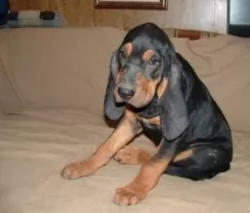 The Majestic Treehound is a large sized working dog. This dog is a cross between the Bloodhound and the Black and Tan Coonhound. Both male and female stand at roughly 61-76 cm in height and weighs in at about 33 – 50kg.
The Majestic Treehound is a large sized working dog. This dog is a cross between the Bloodhound and the Black and Tan Coonhound. Both male and female stand at roughly 61-76 cm in height and weighs in at about 33 – 50kg.
If you want your dog to become a parent, you can expect between 2 to 6 of the cutest puppies.
The coat is smooth, short and dense and comes in a number of colors such as black, black and tan grey and white as well as red and blue ticking.
The dog has sunken brown or yellow eyes, particularly long, floppy ears, a deep chest and a long tail. The tail is set high and is thick at the base and is essentially carried in accordance with the dog’s mood. The tail is never carried over the back. There was a time when the tail of the Majestic was docked, giving him an attractive, compact look. They are powerfully built dogs with a dignified look to them.
The Majestic Treehound has always been a most fearless and adept hunter and he is a dog that just loves being busy. They are also loyal and devoted companions for their human families.
He is a huge dog but he is gentle, good natured and kind with children and is also willing to get on well with pets in the home. You won’t find him being much of a guard dog though because he is just too friendly for this.
He is a dog that is going to need regular exercise, and his sheer size and exercise requirements will make it that he is better off living in the countryside than in the city.
He is an intelligent dog who will be easy to train. Training and socialization will be good for him as he knows exactly how to behave in different situations. He doesn’t want to be left on his own for too long because he bonds closely with his owners and wants to be around them constantly.
 The modern Bichon Frise is a white, small dog with a round skull and muzzle. The nose should be black and the eyes round and dark. Depending on the size of the dog, the legs and head are proportionate to the body, while the tail should be curly and long. Both the tail and the ears must not be docked. Their coat is as hypoallergenic as a dog gets. It is white, dense and for most Bichon Frise, it is curly. They should have black lips as well.
The modern Bichon Frise is a white, small dog with a round skull and muzzle. The nose should be black and the eyes round and dark. Depending on the size of the dog, the legs and head are proportionate to the body, while the tail should be curly and long. Both the tail and the ears must not be docked. Their coat is as hypoallergenic as a dog gets. It is white, dense and for most Bichon Frise, it is curly. They should have black lips as well.
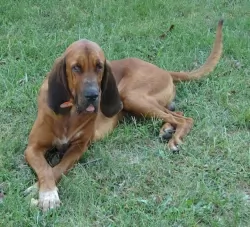 This large attractive dog has a gentle nature and is loving and affectionate towards his human family, getting on well with children and other pets in the family.
This large attractive dog has a gentle nature and is loving and affectionate towards his human family, getting on well with children and other pets in the family.
As with most little dogs, this big dog doesn’t like to be left alone for a long time. With training and socialization he becomes obedient and amicable, knowing how to behave well so that he can be taken anywhere.
Treat this loving dog with love and care and he is guaranteed to make you a splendid family pet.
 The Bichon Frise, according to the American Kennel Club is a cheerful and merry dog. They are gentle, playful, sensitive and affectionate. These dogs love people, are very social and like other dogs as well. They love to play with children and they are intelligent and affectionate. They were developed in their latter stages by the French to be “lap dogs” or companion animals. They are not territorial by nature but can become so if confined and encouraged. Start obedience training early and be consistent throughout their lives. They take to training easily if positive techniques are used. They do however, have a reputation for not taking well to housetraining. Be persistent
The Bichon Frise, according to the American Kennel Club is a cheerful and merry dog. They are gentle, playful, sensitive and affectionate. These dogs love people, are very social and like other dogs as well. They love to play with children and they are intelligent and affectionate. They were developed in their latter stages by the French to be “lap dogs” or companion animals. They are not territorial by nature but can become so if confined and encouraged. Start obedience training early and be consistent throughout their lives. They take to training easily if positive techniques are used. They do however, have a reputation for not taking well to housetraining. Be persistent
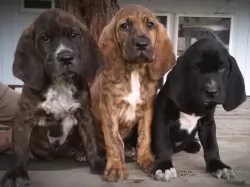 The Majestic is a robust breed, and with good food and exercise he can live to be between 10 and 13 years of age.
The Majestic is a robust breed, and with good food and exercise he can live to be between 10 and 13 years of age.
It has been discovered that like many other dogs, he can battle with hip dysplasia. Large dogs are more prone to hip dysplasia. It is an abnormal formation of the hip socket. It’s a serious condition that can cause arthritis and lameness.
Hip dysplasia often begins when a dog is still a puppy. One of the symptoms is difficulty with getting up after lying down, pain in hip joints and even loss of muscle mass. You will need to get your pet to the vet. The vet will perform a complete physical exam on your dog and then talk to you about treatment.
 The coat of the Bichon Frise can easily become matted if not brushed or combed every day. Severe matting can lead to a hematoma in their ears. They are also very prone to ear infections so paying a lot of attention to their ears is imperative. They are will chew and scratch themselves if not groomed well and this can cause skin infections and conditions. They might have allergies to fleas, pollen, chemicals, and dust. The patella (knee cap) can be loose, diabetes, cataracts and heart disease also affect the Bichon Frise. In the United Kingdom the number one cause of death for the breed is old age -13 plus years, with 21% dying of cancer. In North America cancer is the number one killer as it is for most dogs. The Bichon might also be afflicted with hematologic disorders such as AIHA (Autoimmune hemolytic anemia) and ITP (Immune-mediated thrombocytopenia) which while less common than cancer will kill the dog much earlier in life than cancer. The other condition that the Bichon Frise is prone to are liver shunts. If found early they can be surgically corrected but most are not, and liver failure is eventually the cause of death.
The coat of the Bichon Frise can easily become matted if not brushed or combed every day. Severe matting can lead to a hematoma in their ears. They are also very prone to ear infections so paying a lot of attention to their ears is imperative. They are will chew and scratch themselves if not groomed well and this can cause skin infections and conditions. They might have allergies to fleas, pollen, chemicals, and dust. The patella (knee cap) can be loose, diabetes, cataracts and heart disease also affect the Bichon Frise. In the United Kingdom the number one cause of death for the breed is old age -13 plus years, with 21% dying of cancer. In North America cancer is the number one killer as it is for most dogs. The Bichon might also be afflicted with hematologic disorders such as AIHA (Autoimmune hemolytic anemia) and ITP (Immune-mediated thrombocytopenia) which while less common than cancer will kill the dog much earlier in life than cancer. The other condition that the Bichon Frise is prone to are liver shunts. If found early they can be surgically corrected but most are not, and liver failure is eventually the cause of death.
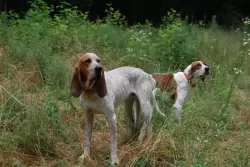 Occasional brushing, perhaps twice a week, will be enough to maintain this dog’s short coat. The long ears tend to drag on the ground, collecting dirt and moisture, and the ears particularly will need to be washed or wiped down and checked inside for infection.
Occasional brushing, perhaps twice a week, will be enough to maintain this dog’s short coat. The long ears tend to drag on the ground, collecting dirt and moisture, and the ears particularly will need to be washed or wiped down and checked inside for infection.
This is a dog with high exercise requirements. A walk a day for him is a good thing but it won’t be enough – he will need some rough and tumble games and want to join you on hikes, swimming and jogs.
Majestic Tree Hounds require nutritious food. If you want to use commercially manufactured food, make sure its the better one as some of the cheaper brands put fillers, preservatives and colorants in and this can cause a whole lot of damage for your dog.
Buy quality food for your pet. The idea is to keep things simple for your big dog so that he doesn’t succumb to digestive problems. Apart from top quality kibble, homemade food will be excellent for him. Boiled chicken cooked in some coconut oil with some brown rice and pasta and some cooked or raw vegetables will be delicious for your dog. You can add it to his dry kibble. Remember to ensure he always has cool, fresh water.
 Being a small dog, the Bichon Frise is susceptible to obesity and that condition will be terminal in the end for this breed. So make sure you do not overfeed your Bichon Frise. The same is true with the use of treats. The Bichon loves treats and loves the association with treats of having pleased you. They should be fed small meals – about ¼ cup of good high quality dry food twice a day.
Being a small dog, the Bichon Frise is susceptible to obesity and that condition will be terminal in the end for this breed. So make sure you do not overfeed your Bichon Frise. The same is true with the use of treats. The Bichon loves treats and loves the association with treats of having pleased you. They should be fed small meals – about ¼ cup of good high quality dry food twice a day.
As previously mentioned the Bichon Frise is susceptible to:
Hematomas and infections of the ear if not groomed well and consistently.
Cancer is number one killer.
Hematological Issues are deadlier than cancer.
Liver shunts are a very serious concern.
Though the Bichon Frise is not an overly active dog, they do love to play. They are characterized by short bursts of activity followed by long periods of rest. They can be worn out just by running around the house. You must play with them everyday as well as take them on a walk each day. Bichons are fast and agile and do well in agility trials. They also like to compete in rally and obedience trials. Most of all they love to and need to play with their people every day.